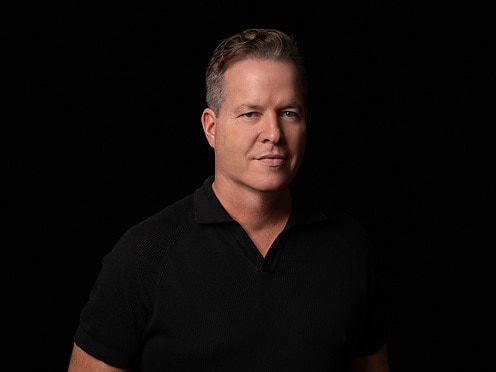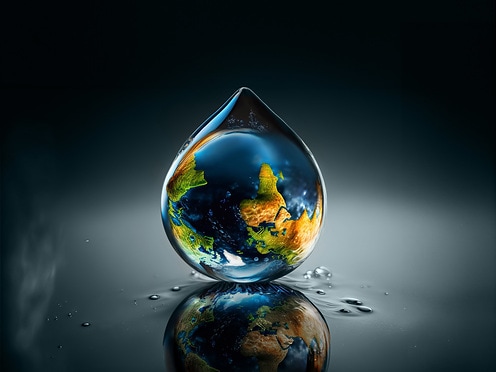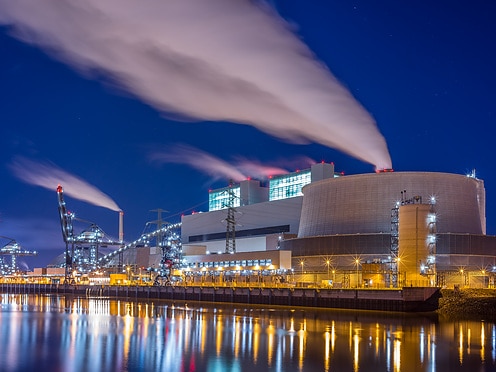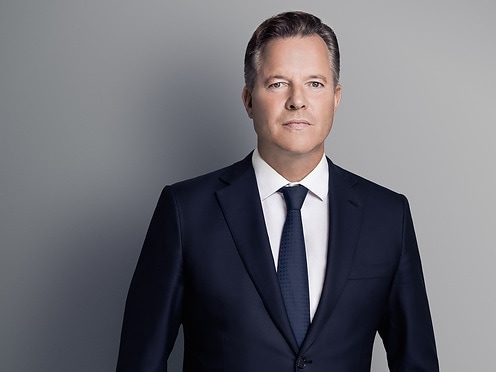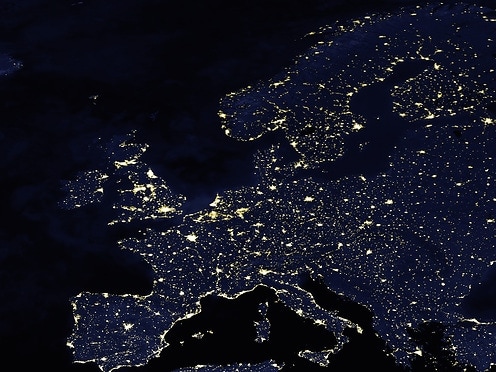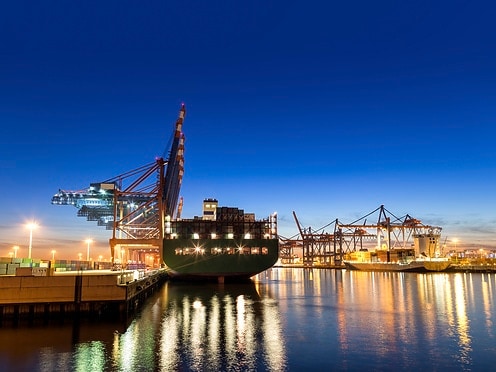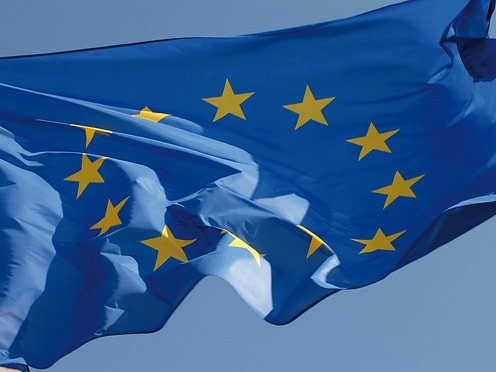Europe is not dead! Embracing the future with CCC.
Creating, Caring, Connecting – the three-pronged approach for defining European politics. Europe can become the most sustainable continent in the world in three areas. An ambitious goal that could save the European idea.
Oliver Hermes is President & CEO of the Wilo Group, Chairman of the Board of Trustees of the Wilo-Foundation, member of the Board of Trustees of the Family Business Foundation, member of the Board of Trustees of the German Sustainability Award (DNP), member of the Executive Committee of the Near and Middle East Association (NUMOV) and member of the Executive Board of the Africa Association of German Business and the Sub-Saharan Africa Initiative of German Business (SAFRI). He is an essayist with articles published in independent media. The opinions expressed are those of the author only.

It is no exaggeration to say that the European idea has never been as at risk as it is today. “We must be lucid about the fact that our Europe is mortal. It can die. It can die and whether it does depends entirely on our choices,” said French President Emmanuel Macron recently in a highly acclaimed speech at the Sorbonne University in Paris.
“Europe can die” – a correct, albeit worrying statement. But conversely, this also means that our Europe is not dead yet. It is not just at a turning point, as Macron explains. It is now facing a historic opportunity to set a new course. The 2024 European elections will not only set the course, but they are also probably the most important European elections in history.
Can the EU Commission also sense this spirit of optimism when it carries out its political work in Brussels? Probably not. It is after all in constant crisis mode. The European Union must respond to several highly complex challenges and their far-reaching consequences at the same time. Climate change, Russia's war of aggression against Ukraine, the conflict in the Middle East: there are too many to list them all.
The key problem here is that Europe reacts. However, this is not enough to achieve a “Europe of strength”, as Macron is calling for. The EU must finally be proactive and “get ahead of the situation”. It must initiate overdue reforms. And to achieve this, it must develop an overarching and visionary European 2050 ambition which takes precedence over all other political strategies and concepts.
Only by doing this will the EU manage to break free of its constant habit of reacting and keep pace with developments in the global South in the long term. This will also make the EU more attractive for its citizens as well as for foreign direct investment, which is a reflection of how attractive the continent is for business and industry.
Strong economies always secure democracy by honouring their promises of prosperity. However, if the economy continues to decline over a prolonged period of time and we fall further behind in terms of growth in Germany, for example, the associated loss of prosperity and lack of a positive outlook for the future will potentially lead to social upheaval that puts our democratic systems at risk.
So, what should the European ambition look like? Carbon neutrality is an obvious point. This goal is expressed in the Green Deal proclaimed by Commission President Ursula von der Leyen. But this concept falls short! The new European ambition must go beyond the obvious and further define sustainability.
“The key problem here is that Europe reacts. However, this is not enough to achieve a ‘Europe of strength’, as Macron is calling for. The EU must finally be proactive and ‘get ahead of the situation’.”
Its aim must be nothing less than not only to safeguard the quality of life of Europeans, but to actually improve it. Now is exactly the right time not only to lead the continent out of the crisis, but also to make it fit for the future and make up for past failures – it is time for a European sustainability strategy! The goal: to be the most sustainable continent in the world by 2050.
This sustainability strategy must be based on three principles. First of all, Creating: Europe must empower business and industry to create sustainable solutions so that we can secure our critical infrastructure independently and autonomously. This includes defence, healthcare, energy security, water security, climate protection and digital transformation. Secondly, Caring: Europe must take better and more responsible care of its citizens in order to show them that they live on what is probably the most liveable continent on earth, both today and in the future. And finally, Connecting: Only with strong partnerships within and outside the European Union can we meet the megatrends of our time through networking.
For such a comprehensive sustainability strategy to succeed, the business community needs to be involved. Only by working with it and not against it will the plan succeed!
Let’s go through the European sustainability strategy to be formulated by the EU for each area of action. The success of all efforts in the area of Creating depends on sovereignty – it is a basic prerequisite for securing Europe’s critical infrastructure and making it fit for the future! The EU must take active steps to become an equal partner on the world stage and must no longer be relegated to the role of “follower” or “junior partner” between the USA and China.
This must also be reflected in a European defence strategy, which Europe undoubtedly needs in view of the war in Ukraine and the uncertain future of NATO (the upcoming US elections do not bode well). There is some work to be done in the area of defence! Although it is utopian to build a European army, our aim must be to intelligently interlink national defence budgets and create a complementary defence network at European level.

It is industry that could implement this approach. An intact industry along the entire value chain will make a decisive contribution to improving Europe’s defence capability. There is no sovereign and secure Europe without industry!
This is also evident in Europe's healthcare system. The resilience of critical infrastructure and, in particular, the supply chains for medical and pharmaceutical goods in Europe were put to the test not only by Russia's invasion of Ukraine and the resulting energy crisis, but also by the coronavirus pandemic. Considerable deficits and gaps subsequently became apparent, which continue to this day. The pharmaceutical industry should urgently be kept not only in Europe. Rather, the EU is called upon to create incentives to deepen value creation in Europe in this respect. Once again, the healthcare industry and the pharmaceutical industry create sovereignty.
Europe has only recently realised how important energy supply is for achieving the targets in the Creating impact area. The energy crisis hit us suddenly and continues to have a considerable impact on the economy and industry in some areas. In Germany in particular, deindustrialisation is not sneaking up on us, it is galloping ahead.
Even today, energy is often only discussed in terms of the supply side. However, one way out of the cost trap and the dependencies and associated supply risks is to more effectively incentivise measures to reduce energy demand. Saving energy is the order of the day! This requires efficient products, systems and solutions that the European economy can contribute. Once again, its relevance for the European sustainability strategy is evident.
To date, water supply has received much less attention than energy supply. At the same time, water shortages today and especially in the future pose (at least) as great a risk to our prosperity and the quality of life of Europeans.
This is shown by the images of large-scale forest fires that reach us at regular intervals from southern Europe. Last year alone, 91,000 hectares of land were burnt in Spain, and Catalonia has been suffering from acute water shortages for three years. The Intergovernmental Panel on Climate Change predicts that a total of 44 million Europeans will be affected by this in 2070. Rivers in central and southern Europe could be carrying up to 80 per cent less water by then.

Europe must therefore set the course for the future today and dedicate itself to the ambitious project of formulating a water strategy (as a functional strategy subordinate to the sustainability strategy) and a Blue Deal and thus harmonising its entire water infrastructure by 2050. Part of the European water strategy must be to be able to transport water in long pipelines from the water-rich north and east to the water-poor south of Europe. This will create a European long-distance water network – and thus inevitably a European water market. This is an overdue reform, considering that we have long been thinking about electricity, gas and telecommunications in European terms.
Of course, the ideas must not stop at water pipes that run across the continent. The Blue Deal must be larger and more holistic in nature. The modernisation of old, inefficient water infrastructure, the sponge city concept, the clever treatment and use of sewage, including the removal of micropollutants to eliminate trace substances, must be part of a contemporary and future-oriented response. The European economy and industry must therefore be involved in every conceivable form of the Blue Deal.
“Europe must therefore set the course for the future today and dedicate itself to the ambitious project of formulating a water strategy (as a functional strategy subordinate to the sustainability strategy) and a Blue Deal and thus harmonising its entire water infrastructure by 2050.”

It goes without saying that a European sustainability strategy must also focus on climate protection. The goal of becoming the first carbon-neutral continent on the planet by 2050 is important, and the Green Deal is a significant initiative to combat the climate crisis. After all, the climate needs trailblazers and pioneers. There must now be someone who speeds ahead and that could very well be Europe.
And yet the Green Deal is more of a hygiene factor. However great the efforts on the road to carbon neutrality may be, it is not enough as an overarching European ambition. The Green Deal must be a (central) pillar of our sustainability strategy – along with many others.
Digitalisation can undoubtedly accelerate the implementation of the Green Deal and the Blue Deal. It should be seen as a key factor that can make a significant contribution to energy security, water security and climate protection. The products, systems and solutions required for these projects will once again require a resilient European economy and industry. After all, the products, systems and solutions that protect the climate are usually also the ones with the highest level of digital intelligence. Digitalisation is a driver of European sustainability efforts.
Let's take a look at the second area of impact of the EU sustainability strategy: Caring. What do we understand by this?
The European Union is a historic project promoting peace and freedom. The main reason for this success story is certainly the strong set of values that the European community has agreed on – partly formally, partly as an “unwritten law”. We should not underestimate the importance of Europe as a community of values! Often taken for granted, it is the basis for all forms of political, economic and social co-operation at European level.
But it is precisely this set of values that is facing a crucial test. The European Union has to grapple with its own disintegration like probably no other political institution. Today, there can hardly be any serious doubt that the UK’s “Brexit” from the European Union has had a negative impact on the prosperity of the British people. Nevertheless, the Alternative for Germany (AfD) party called for a “Dexit” – Germany’s exit from the European Union.
Proposals such as Brexit and Dexit are all the rage these days. Right-wing populist or far-right parties are on the rise in many EU member states. Whether in Northern, Eastern, Southern, Western or Central Europe: nationalist parties are unfortunately gaining ground. Their standard repertoire includes Eurosceptic or even anti-European ideas that jeopardise Europe as a community of values and thus the European Union as a whole.
Europe’s response to this dramatic development must be “more Europe”!
More growth: a growth strategy as part of a sustainability strategy? Absolutely! Growth and sustainability are not mutually exclusive. If the EU wants to sell itself and the European idea to its citizens again, i.e. counter the rampant right-wing populism, it must take care of their prosperity. Economic growth is the best way to counter these anti-democratic forces. Business and industry therefore also have an important role to play here. Their success creates prosperity – and therefore stability.
But growth also means an expansion of the EU: more accession negotiations or even enlargements would send out a strong signal. It is therefore a good thing that the European Union is resuming its enlargement policy after a hiatus of several years in the wake of Russia’s war of aggression against Ukraine. Accession negotiations and enlargements are important instruments for stabilising Europe and its neighbourhood. In addition, the EU must send a strong signal, especially after Brexit, that European integration will continue in geostrategic terms.
“Europe, take responsibility for yourself and your citizens! For example, in the implementation of the European water strategy and the Blue Deal: the responsibility for this must lie at European level.”
More solidarity: solidarity between European countries is the nucleus of the European project. Between the rich and the poor, the big and the small, as well as the water-rich and the water-poor. A European water strategy and the Blue Deal could be the positive narrative that the European Union needs right now. In times of increasing water shortages, the European Union has a role to play as a solidarity-based distributor of the most important and existential resource.
More responsibility: a political institution such as the European Union is only relevant and fit for the future if it demonstrates responsibility. An EU that focusses politically on minor and marginal issues and delegates responsibility back to the countries would have no chance of survival. Europe, take responsibility for yourself and your citizens! For example, in the implementation of the European water strategy and the Blue Deal: the responsibility for this must lie at European level. Such an impact would be doomed to failure if it were to end in petty nationalism. The municipalities should therefore not be given sole responsibility. In this case, the nation states will also have to give up some of their co-determination in favour of the European community.
Calculations by the German Economic Institute show the consequences of a return to petty nationalism. The IW has calculated that a Dexit would reduce economic growth in Germany by six per cent. In ten to 15 years, it would mean a loss of up to 500 billion euros. 2.2 million jobs would be at stake. Dexit is a highly dangerous thought experiment.

Finally, the last of the three principles on which the European sustainability strategy and thus the overarching European ambition is based: Connecting.
It has long been clear that strong partnerships are needed to counter the global megatrends. However, the geo-economic turning point that we are experiencing as a direct consequence of the omnipresent geopolitical turning point has obvious consequences worldwide: old alliances are crumbling and multinational co-operations are realigning themselves. Protectionist instruments – such as trade barriers, sanctions and technology embargoes – are the result of the politically driven decoupling of supply chains initiated with the extremely challenging goal of restructuring them.
However, the hyper-globalisation of recent decades cannot be turned back. In the political sphere, it is also often forgotten that there can never be an “end-to-end” independence of economies with complex systems. It is therefore not surprising that the politically motivated readjustment of supply chains is not having the desired effect.
A sustainable Europe is therefore a Europe of connectivity – a Europe of bridges! Multilateralism is the answer. The EU must not only strengthen itself internally, but also externally through partnerships with stakeholders, countries and regions around the world. The organisation of these partnerships is of central importance: programmes such as the “Global Gateway” initiative, which aims to connect European Union countries more closely with emerging and developing countries, cannot work because they are too bureaucratic and are not formulated on an equal footing with the partner countries.
Instead, it is new, additional free trade agreements that could be considered as instruments here. Trade creates prosperity! Europe should not make the mistake of dividing the world, and therefore potential partners, into “good” and “bad”. If we want to build bridges sustainably, we should avoid the politics of “finger pointing”.
Business and industry friendliness must therefore be the common thread running through all three areas of action outlined in the EU sustainability strategy!
Europe cannot embark on the path to becoming the most sustainable continent in the world without promising prosperity and thus a positive future for its citizens. In doing so, we are committed to leading not only European industry, but also the national economies and their fellow citizens as a whole into a prosperous future. Towards a sovereign Europe.




